[最も選択された] oracle utl_file.put_line clob 237088-Oracle utl_file.put_line clob
From Oracle 10g onwards, it is possible to write a CLOB to a file with a single call, using the DBMS_XSLPROCESSORCLOB2FILE procedure In the following example, we will prepare a temporary CLOB with our data instead of writing it with UTL_FILE When all source data has been added to the CLOB, we will write it to a flatfile in a single call1016 · Background The arcane LONG datatype has as you're aware of many intrinsic limitations but unfortunately Oracle still uses quite a few LONG columns in the data dictionary It's beyond me why these haven't been converted to CLOB a very long time ago (when Oracle deprecated usage of LONG) At the same time, Oracle only provides the following means of converting these LONG columns to eg CLOB1 thought on " Dump Upload CLOB to, from file in Oracle " Fiona Schultz on June 21, 18 at 1254 pm said This is a lifesaver to me now Thank you!
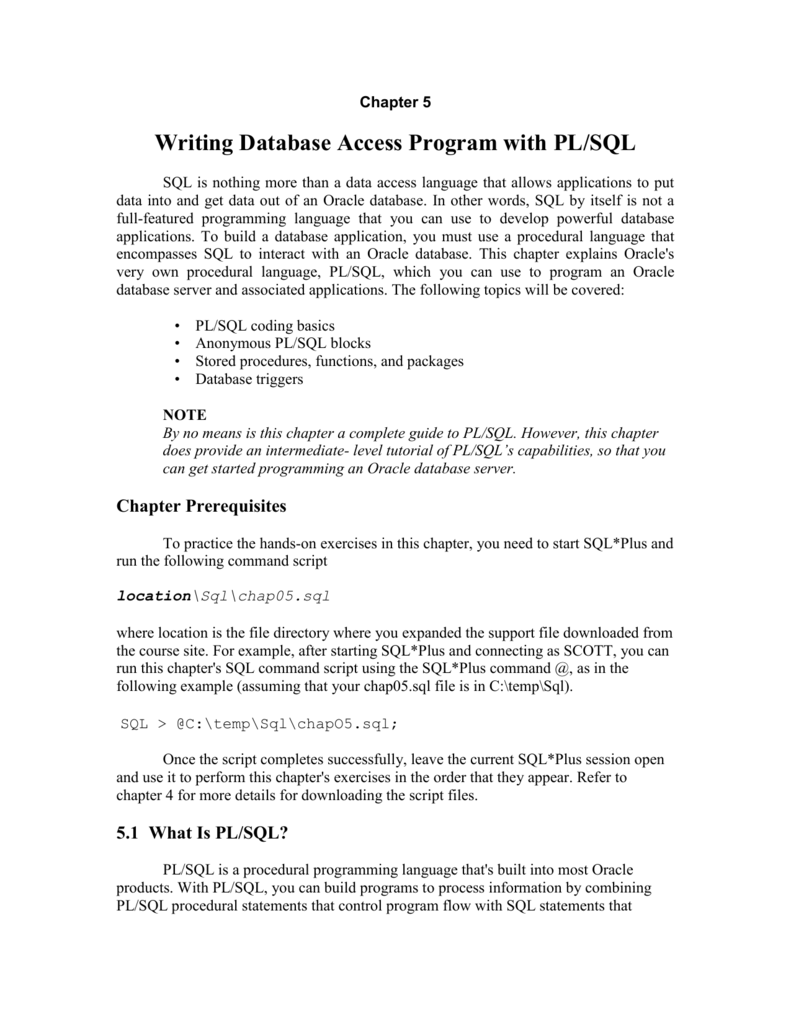
Text Of Chapter 5
Oracle utl_file.put_line clob
Oracle utl_file.put_line clob-Oracle clob export/import across non linked instances 0 Oracle Exchange partition from non partitioned table 3 Inserting data into a table with one value as clob and blob 1 How to add a column from another table?Select * from t1 minus select * from t2 * ERROR at line 1 ORA inconsistent datatypes expected got CLOB Apparently, the SET operators (minus) does not support CLOB



Writing File To Oracle Directory Ontoor Solutions Blogs
Use UTL_FILEPUT_LINE to write a line of text to a file UTL_FILE « System Packages « Oracle PL / SQLA CLOB (or character large object) is a Oracle datatype that can contain singlebyte or multibyte characters with a maximum size of (4 gigabytes 1) * (database block size), then more than the varchar2 with this maximum of 4000 bytes If we want to load the content of the external table wiki page in the database, we will reach easily the limit of 4000 characters that as a varchar2Statement 1 CREATE OR REPLACE PROCEDURE print_clob_to_output (p_clob IN CLOB) IS l_offset INT = 1;
Set serveroutput on declare l_file utl_filefile_type;BEGIN dbms_outputput_line ('Print CLOB');In this post I am trying to execute some of the CLOB concat methods and test their performance Lets go one
I'd like to upload numerous files into a CLOB in Oracle 11g I have the table created with the column, I just need to be able to upload the files, hopefully using a stored procedure or Sql ldr I've searched for examples, but didn't quite find exactly what I need to/* Add the line terminator or 2 bytes to its length */ lv_line = NVL (lv_line, '') CHR (10);/* Write to an empty CLOB or append to an existing CLOB



Dbms Xslprocessor Read2clob Example Script To Read A File Data Into Clob Oracle Apps Knowledge Sharing



Dynamic Sql In Pl Sql In V8 Ask Tom
Oracle 73 introduced the UTL_FILE package The UTL_FILE package in the Oracle database is used to write data from the Oracle database to the OS file and also read from the OS file to the Oracle database Mainly three procedures are given in the UTL_File package to read or write the data These procedures are put_line (), putf (), and get_line () · */ UTL_FILE get_line (file => lv_file , buffer => lv_line );Let's consider some examples of the Oracle EMPTY_CLOB function and learn how to use the EMPTY_CLOB function in Oracle PLSQL UPDATE customs SET custom_photo = EMPTY_CLOB();



Amazon Com Oracle Built In Packages Oracle Development Languages Ebook Feuerstein Steven Dye Charles Beresniewicz John Kindle Store



Dbms Xslprocessor Read2clob Example Script To Read A File Data Into Clob Oracle Apps Knowledge Sharing
If unspecified, Oracle supplies a default value of 1024 The GET_LINE len parameter must be a number in the range 1 and If unspecified, Oracle supplies the default value of max_linesize If max_linesize and len are defined to be different values, then the lesser value takes precedence UTL_FILEGET_RAW ignores line terminators1403 · There are 2 steps for inserting data to clob field, 1 Insert the record 2 Open the same row with FOR UPDATE clause and execute the above line of code The problem is while inserting record don't ignore CLOB field, instead use EMPTY_CLOB() in Insert statement as value for CLOBInsert into t2 values ('hello','am I different');



Technicalbits 15



Pl Sql Jeff Kemp On Oracle Page 4
What is the main difference between utl_file put_line and dbms_outputput_line?Syntax of the Oracle/PLSQL TO_CLOB function TO_CLOB(expression_id) Parameters or arguments expression_id – can accept data types CHAR, VARCHAR2, NCHAR, NVARCHAR2, CLOB OR NCLOB The TO_CLOB function returns the CLOB value The TO_CLOB function can be used in the following versions of Oracle/PLSQLThe following is a PL/SQL procedure to update product's price by a percentage value passed as a parameter Also, it will log the information of each step happening in the program Note, you must have a directory object created in Oracle to write the files, check this link to learn how to create a directory object in Oracle



Securefiles Lob And Database File System Dbfs Hands On
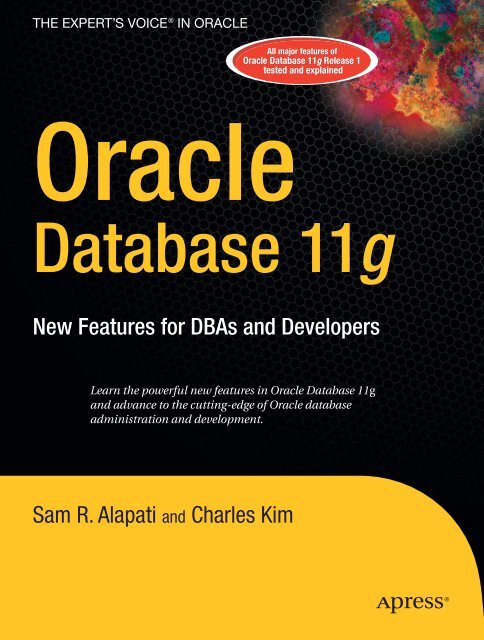


Oracle Database 11 G Online Public Access Catalog
Name of file to write in directory DECLARE buf CLOB;UTL_FILEput_line The put_line procedure writes the text string stored in the buffer parameter to the open file identified by file handle UTL_FILEPUT_LINE (file IN FILE_TYPE, buffer IN VARCHAR2, autoflush IN BOOLEAN DEFAULT FALSE);Loop exit when l_offset > dbms_lobgetlength (p_clob);



Xml And Oracle 8 I A How To



Oracle Capture Pl Sql Output From Dbms Output Put Line To Table Or File Sql Jana
Using CLOB and BLOB Data¶ Oracle Database uses LOB Objects to store large data such as text, images, videos and other multimedia formats The maximum size of a LOB is limited to the size of the tablespace storing it There are four types of LOB (large object)Now, I need to write this CLOB to my IO_DIR on my server /u01/app/oracle/io_dir When the following PL/SQL code is executed, the CLOB gets written to the directory as a text file I believe the entire CLOB is not outputted though because when I try to decode the image is corrupted (only the upper portion of the image comes in)L_amount binary_integer = ;



How To Send Email From Oracle Oracle Database Email



Unlong My Dictionary Those Pesky Long Columns Learning Is Not A Spectator Sport
A simple example is given below to insert a long string into CLOB data type in Oracle You can not insert data directly into CLOB data type, you have to use Empty_Clob() function with returning clause in insert statement then use dbms_lobwrite procedure to write the dataUse DBMS_OUTPUTPUT_LINE to output clob data DBMS_OUTPUT « System Packages « Oracle PL/SQL Tutorial1319 · This is what I tried create table t1 (x varchar2(10), y CLOB);



Technicalbits 15



Stored Procedure Insert Clob Obj Msg Error Ora Unimplemented Eehelp Com
0 How to total additional results from alias column results in OracleT_amount BINARY_INTEGER = 1000;This is not an APEX specific issue, however it could be useful for some of your PL/SQL code I ran into an issue today where I had to append VARCHAR2s to a CLOB many times in a loop I



Dbms Xslprocessor Read2clob Example Script To Read A File Data Into Clob Oracle Apps Knowledge Sharing



Reading File From Oracle Directory Ontoor Solutions Blogs
BEGIN SELECT textcol INTO buf FROM uwclasst WHERE rownum = 1;Answer Both dbms_output and utl_file have a put_line procedure, but dbms_outputput_line is used to display the output on the SQL prompt utl_fileput_line is used to write to file16 · I am fetaching XML from SP ( Oracle DB) as CLOB Datatype using out Parameter I am getting value in output parameter but i am not able to convert CLOB into string I want to convert into string and then load it as XML object and display vales from XML to frontend Any help is



The Oracle Ebs Pl Sql Implementation Saves The Queried Data As A Csv Format File And Periodically Uploads It To The Ftp Server Programmer Sought



Text Of Chapter 5
In Oracle 9iR2 (92) it is also possible to perform this operation using new functionality provided by the UTL_FILE package First we create a directory object pointing to the destination directory CONN / AS SYSDBA CREATE OR REPLACE DIRECTORY BLOBS AS '/tmp/';By default, UTL_FILE only allows a small line width Change utl_filefopen ( p_directory, p_filename, 'w');SQL> select * from t1 minus select * from t2;



Clob Data Don T Want To Save Oracle Xml Clob Pl Sql Utl File Stack Overflow


Oracle Pl Sql Ebsguide
In our Oracle programming life, we append lot of strings to CLOB There could be various ways to append string to CLOB Mostly programmers use simply concat operator () for this, but is it the optimized way to append String to a CLOB?Export CLOB field (long= 4) to a file with UTL_FILEPUT or PUT_LINE Hello, I'm trying to export a CLOB field to a txt file It's a xml string in the CLOB I have used different methods but the only which i can use is PUT, PUT_LINE But PUT does only export the characters I see that the output of l_pos is 42Loop dbms_lobread (l_clob, l_amount, l_pos, l_buffer);



Oracle To Db2 Conversion Guide Compatibility Made Easy Front Cover Manualzz



Http Request Failed Ora 363 Message 363 Not Found Product Rdbms Facility Ora Oracle Tech
I believe Oracle's ODPNET Provider will return a LOB in a REF_CURSOR, which would enable you to use a stored procedure AFAIK, there is no support for LOB IN/OUT parameters There is a Visual Studio Magazine article from March 03 that covers this If you don't have the magazine you can create an FTP account and login to read the articleUTL_FILEPUT_LINE ( file IN FILE_TYPE, buffer IN VARCHAR2, autoflush IN BOOLEAN DEFAULT FALSE);T_pos INTEGER = 1;


Generate Dbf File In Oracle Directory Using Oracle Pl Sql Doyensys Blog



I O And Pl Sql Pl Sql Application Construction Oracle Pl Sql Programming 14
Insert into t1 values ('hello','please compare me');Security Model UTL_FILE is available for both clientside and serverside PL/SQL Both the client (text I/O) and server implementations are subject to serverside file system permission checking In the past, accessible directories for the UTL_FILE functions were specified in the initialization file using the UTL_FILE_DIR parameterGetChars public int getChars(long pos, int length, char buffer) throws javasqlSQLException Oracle extension Return copy of the substring of the CLOB at the requested position Parameters buffer is the buffer into whcih the characters are read pos is the first character of the substring to be extracted


Advanced Pl Sql Interview Questions And Answers Webbopedia
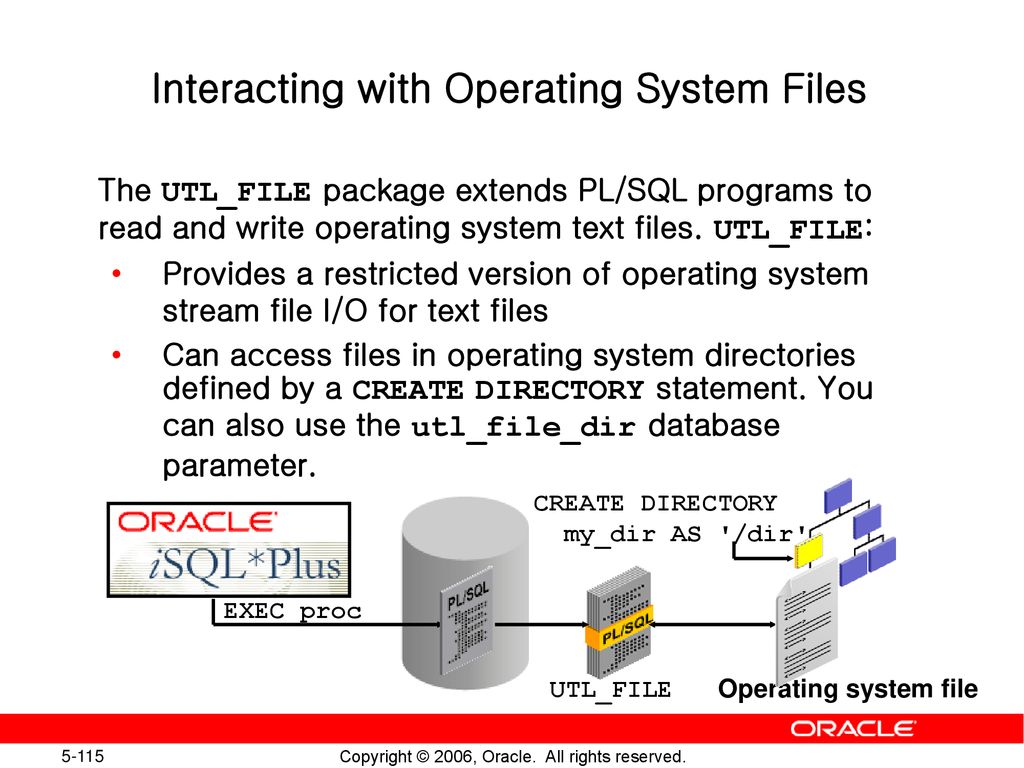


Introduction Ppt Download
· Splitting CLOB fields in Oracle is more tricky than VARCHAR2 I found a couple of implementations online, but all of them were reading data linebyline which is slow My version reads big chunks (32K) and then splits them See process your line here line in the code If you need to postprocess every line in CLOB, this is the place to do it · 2 TO_CLOB enhancement converting BFILE/BLOB to CLOB – File to CLOB TO_CLOB (BFILENAME ( directory_name, file_name ), charset_id ) eg SQL> set long 5000 SQL> SQL> select to_clob (bfilename ('DATA_DIR', 'testxml'), nls_charset_id ('AL32UTF8')) 2 from dual;Buffer IN CLOB, location IN VARCHAR2, Oracle Directory Object Name filename IN VARCHAR2);



Use Utl File To Write Files In Mysql Utl File Pl Sql Application Programmer Sought



Test By Juan Perez Issuu
首页 > 数据库 > Oracle > Oracle之UTL_FILE 包用法详解 Oracle之UTL_FILE 包用法详解 Oracle 作者: bfc99 时间:1407 0 删除 编辑To allow a line to go up to 32k in size6 I'm writing a large file > 7MB from an Oracle stored procedure and the requirements are to have no line termination characters (no carriage return/line feed) at the end of each record I've written a stored procedure using UTL_FILEPUT and I'm following each call to UTL_FILEPUT with a UTL_FILEFFLUSH


Archives For April 14 Maclochlainns Weblog


Archives For April 14 Maclochlainns Weblog
· This article contains information on how to convert LONG/LONG RAW into a BLOB/CLOB using PL/SQL To convert LONG/LONG RAW with any size to BLOB/CLOB the SQL functions to_lob() to_clob() can be used in Oracle 10gR2 (101) and higherYou can apply this function only to a LONG or LONG RAW column, and only in the select list of a subquery in anWhen I am trying to write clob data more than 32 KB into a text file using utl_file, I am facing issues I ma getting an error Error OR9285 file write error ORA at line 28 Can you please help declare t_out_file UTL_FILEfile_type; · In addition to the performance benefits and simplification of your application code, there are more builtin functions, as well as operators, for working with VARCHAR2 than with CLOB data So, if your existing CLOB data values are less than 32K, it probably makes sense to consider a data conversion as part of your Oracle 12c upgrade



Chap 10 Rtf Chapter 10 Oracle Supplied Packages Dynamic Sql And Hiding Source Code True False 1 The Basic Mechanics Of The Alert Process Include Course Hero



Writing File To Oracle Directory Ontoor Solutions Blogs
· KEYWORDS ASPNET READ WRITE CLOB DATA, VBNET READ WRITE ORACLE CLOB DATA, ORACLE CLOB, CLOB, ORACLE CLOB READ WRITE Oracle has Varchar2 with max length of 4000 chars If you need to sore more than that you have to use CLOB datatype CLOB stores 4gb of chars But remember, NET Only supports string worth 2gbInsert into tab_clob select wm_concat(level) cStr from dual connect by levelBegin select col1 into l_clob from tab1 where rownum = 1;



The Oracle Ebs Pl Sql Implementation Saves The Queried Data As A Csv Format File And Periodically Uploads It To The Ftp Server Programmer Sought
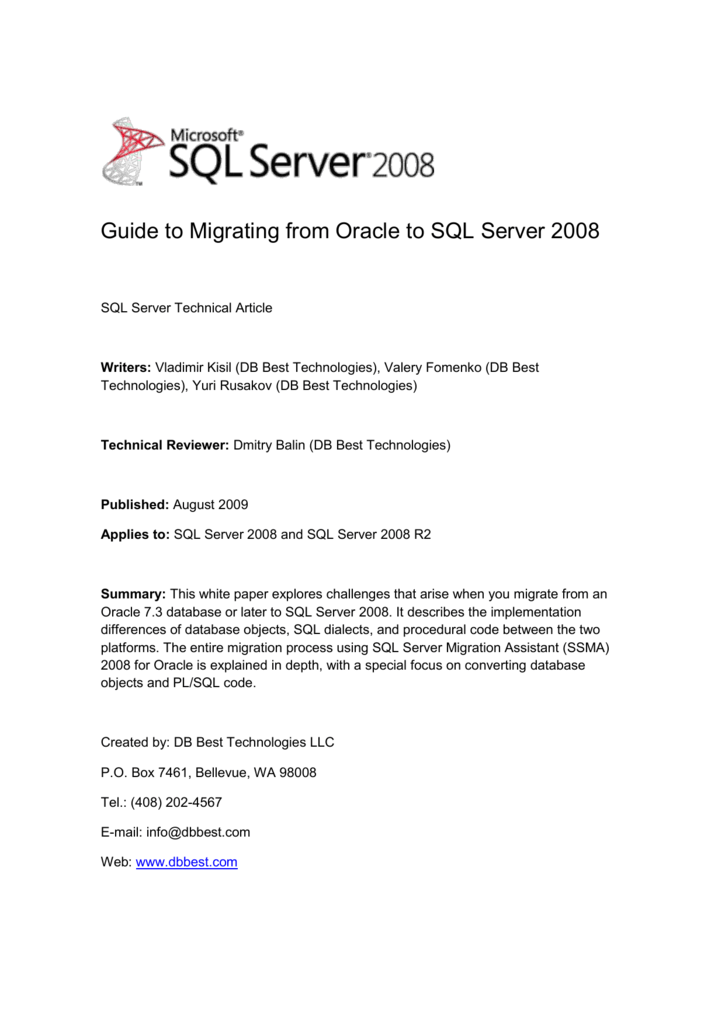


Oracle To Sql Server 08
In Oracle, CLOB data type stores variablelength character data (character large object) in the database character set that can be singlebyte or multibyte (supports more than 4 GB) In SQL Server, you can use VARCHAR(max) or NVARCHAR(max) to store stores variablelength character data up to 2 GBL_pos integer = 1;L_file = utl_filefopen('DOCUMENTS_DIR', 'Sample2txt', 'w', );



January 09 Oraclenerd


Dbms Lob Tips
Running a SELECT query that includes a CLOB column should be roughly as fast as running a SELECT query without the CLOB column Actual behavior Running a SELECT query that includes a CLOB column is about 15x slower than without the CLOB column System configuration Rails version 521 Oracle enhanced adapter version 523 Ruby version 2Calling UTL_FILEPUT_LINE repeatedly in a loop when writing cumulatively more than 1024 characters may fail with the following error OR9285 file write error In some cases, OR92 invalid file operation may also be thrown The environment is running Oracle 102 RDBMS or later and connecting from SQL*Plus client via a database listenerTo utl_filefopen ( p_directory, p_filename, 'w', );



Pl Sql Developers Posts Facebook



Writing File To Oracle Directory Ontoor Solutions Blogs
GRANT READ, WRITE ON DIRECTORY BLOBS TO my_user;This Oracle tutorial explains how to use the Oracle / PLSQL TO_CLOB function with syntax and examples The Oracle / PLSQL TO_CLOB function converts a lob value from the national character set to the database character set · Splitting CLOB strings Instead of seeking a "perfect" custommade solution, I just put together two functions I have already written about The PIPE_CLOB function a pipelined table function that reads a CLOB and outputs up to 4000 bytes at a time, respecting a delimiter
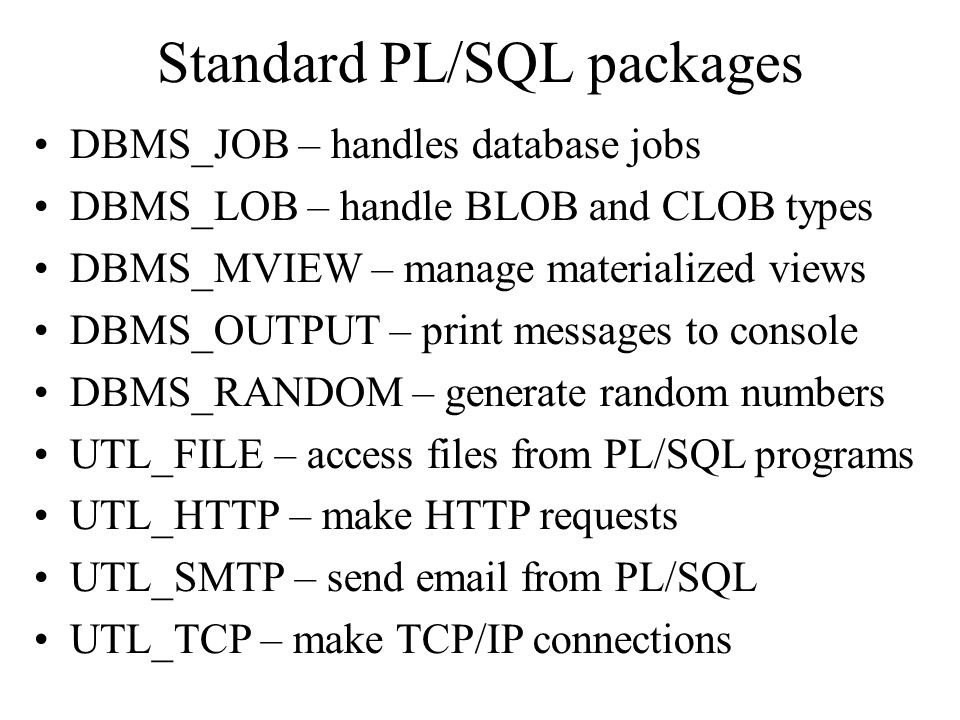


Oracle Database Administration Lecture 5 Triggers Pl Sql Advanced Ppt Download



To Boldly Gzip From Pl Sql The Anti Kyte
Lv_read_size = lv_read_size LENGTH (NVL (lv_line, CHR (10))) 2; · create table tab_clob ( str CLOB);This example EMPTY_CLOB initializes the product_photo column into an empty column This is different from setting a LOB field to null or a LOB row with length 0



Http Request Failed Ora 363 Message 363 Not Found Product Rdbms Facility Ora Oracle Tech



Oracle Dynamic Sql Using Clob Stack Overflow
Dbms_outputput_line ( dbms_lobsubstr( p_clob, 255, l_offset ) );L_offset = l_offset 255;Home PL/SQL Split CLOB into lines Split CLOB into lines Simple requirement – I've got a CLOB (eg after exporting an application from Apex from the command line) that I want to examine, and I'm running my script on my local client so I can't use UTL_FILE to write it to a file


Tuning Pl Sql File I O



Xml Parser For Pl Sql
Create table t2 (x varchar2(10), y CLOB);


Exporting A Clob Myoracledbablog



Chap 10 Rtf Chapter 10 Oracle Supplied Packages Dynamic Sql And Hiding Source Code True False 1 The Basic Mechanics Of The Alert Process Include Course Hero


Pl Sql Maclochlainns Weblog
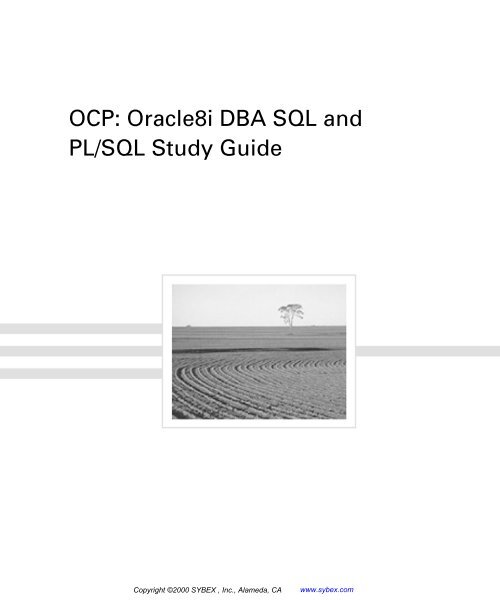


Ocp Oracle8i Dba Sql And Pl Sql Study Guide Portal uj Edu



Utl Http To Call A Web Service From Pl Sql Oratable



The Death Of Utl File Learning Is Not A Spectator Sport



Send An Oracle Database Table Data In Csv File As Mail Attachment Using A Simple Pl Sql Apis
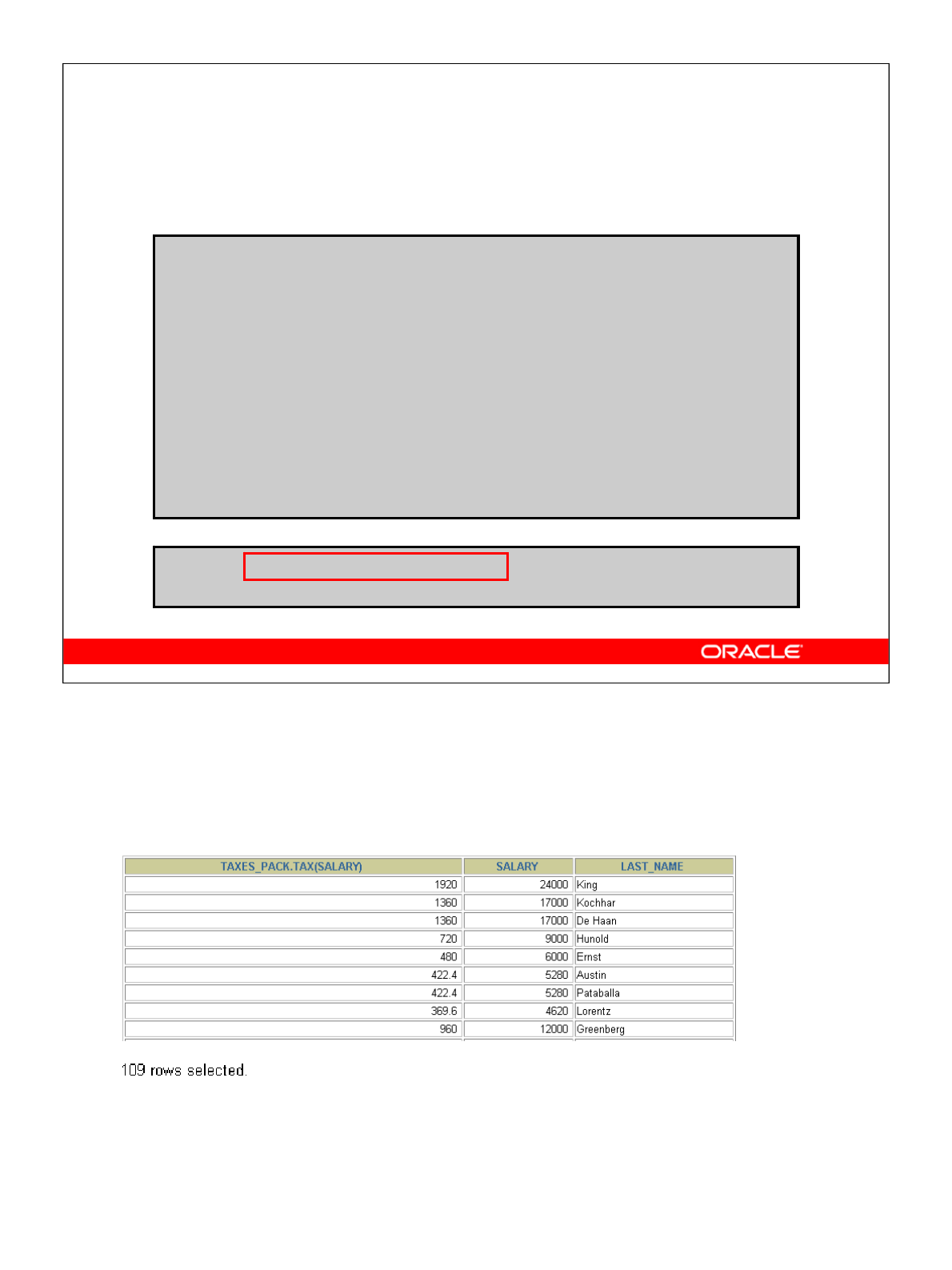


Microsoft Csg1 Oracle 10g Develop Plsql Program Units Volume 1 Student Guide


Writing Clob To File Using Utl File Oracle Tech



Advanced Techniques Of Pl Sql Pl Sql Sql



Using Oracle Supplied Packages
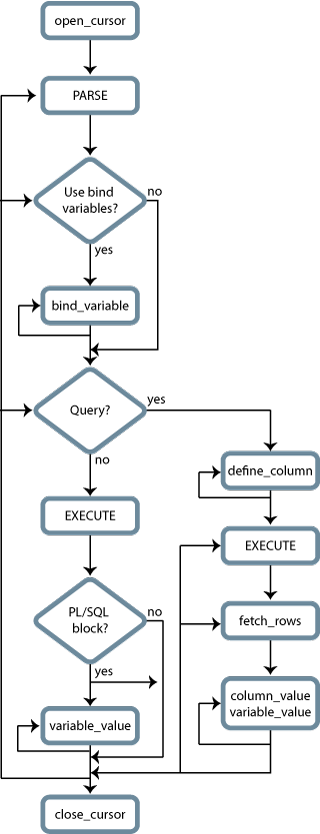


Dbms Sql



Utl File Parameter Computer Programming Computer File


Orafaq Forum Sql Pl Sql Sending A Password Protected Pdf Using Utl Smtp



Oracle World 02 Catapult To The Next Version



Grassroots Oracle February 10



Grassroots Oracle February 10


Tuning Pl Sql File I O



Ora Pl Sql Numeric Or Value Error Using Utl File Put Line Magnusjohanssondba



Xml And Oracle 8 I A How To



Oracle Utf8 File Encoding With Utl File



Oracle Advanced Pl Sql Developer Professional Guide Packt



Loop Cursor Of All Mviews Generate Pl Sql Error Ora Oracle Tech


How To Java Programming In Oracle Database



Unlong My Dictionary Those Pesky Long Columns Learning Is Not A Spectator Sport



Oracle Program With Pl Sql Lession 14



Writing A Unicode File Using Dbms Xlsprocessor From Alt16utf16 Db Oracle Tech
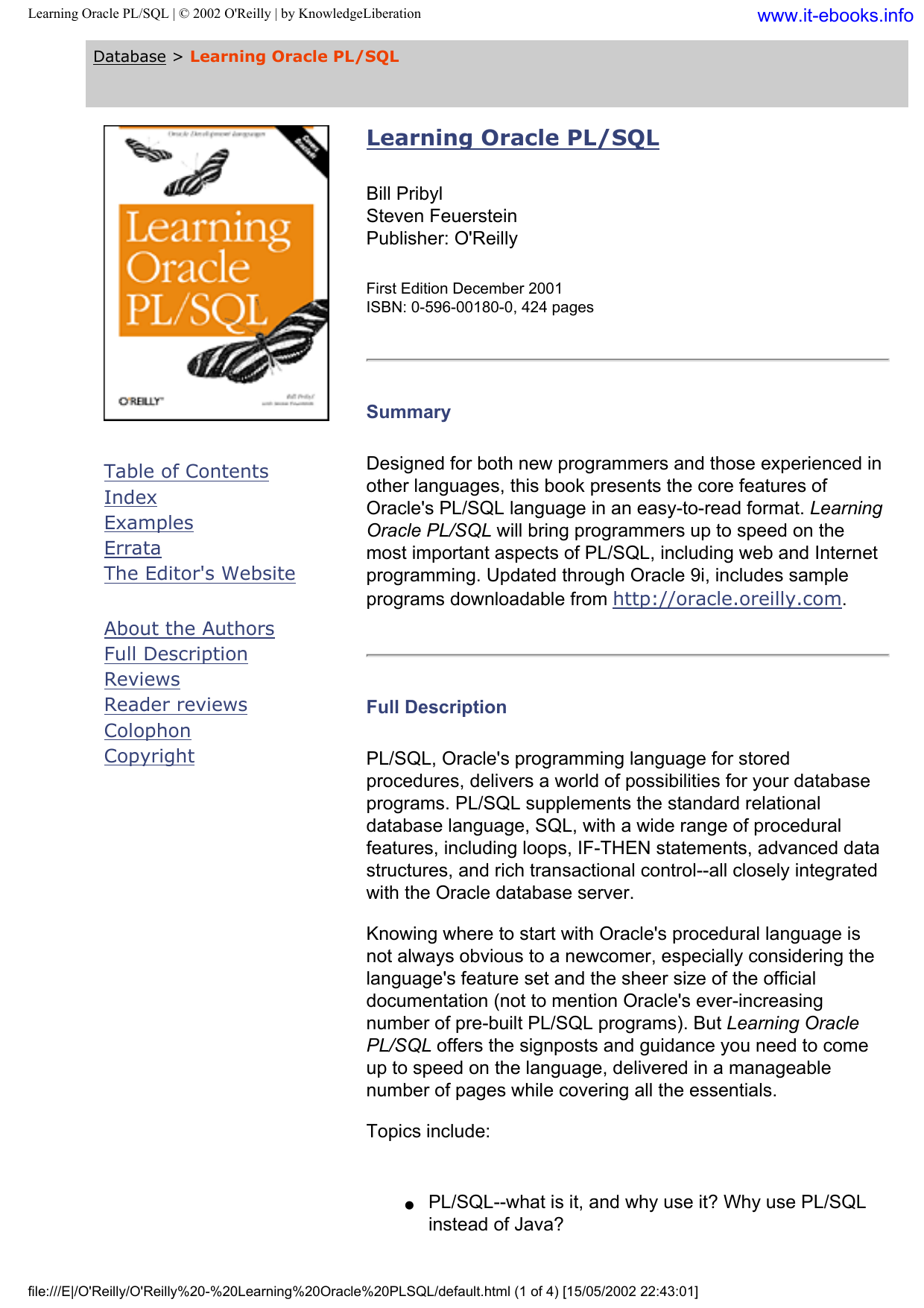


Learning Oracle Pl Sql C 02 O Reilly By Manualzz


Pl Sql



Oracle Supplied Packages Oracle Pl Sql By Example Fifth Edition 15


Tuning Pl Sql File I O



Generate Excel Using Pl Sql Getting Warning Message For Format Issue Oracle Tech
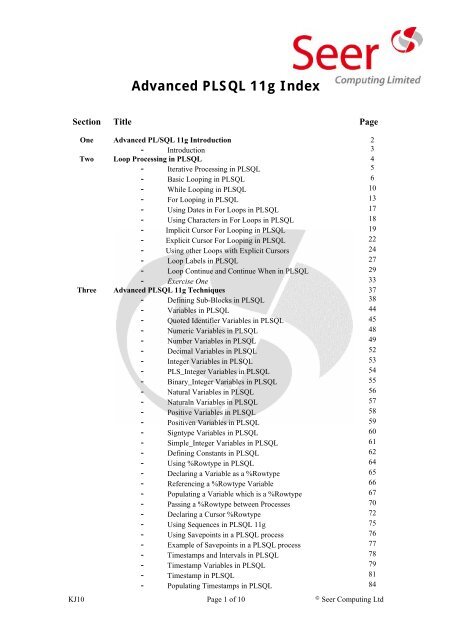


Imyh3qeqms8cdm



Loop Statements



Oracle World 02 Catapult To The Next Version



Writing File To Oracle Directory Ontoor Solutions Blogs


Blog Jmj Cloud



コメント
コメントを投稿